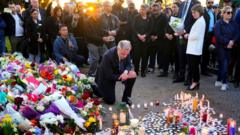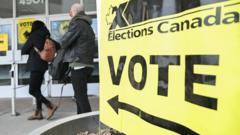As polling stations open across Canada, voters are set to determine their next leader in a shifting landscape characterized by economic anxiety and external pressures from the United States. With the looming threat of President Trump’s tariffs and his controversial comments about Canada possibly becoming the 51st state, the political environment has drastically changed in the weeks leading to this election.
**Canada's Election in Flux: A Showdown Amidst Economic Tensions**

**Canada's Election in Flux: A Showdown Amidst Economic Tensions**
Canada faces a critical election as voting unfolds, marked by economic challenges and a surge in support for the Liberal Party amid U.S. political pressure.
Polls indicate that the Liberal Party, now led by former central banker Mark Carney, holds a slender advantage over the Conservative Party led by Pierre Poilievre, once the frontrunner. The political narrative has shifted dramatically in favor of the Liberals after Justin Trudeau’s resignation and the economic fallout attributed to Trump's trade policies. In addition, the New Democratic Party faces a decline in influence, struggling to maintain voter support at this critical juncture.
These elections are pivotal, with Canadians casting votes not just for their local representatives, but also for a prime minister who will navigate the increasingly fraught relationship with the U.S. as tariffs disrupt Canada's economy. The Conservatives, who once had a robust lead, are encountering pivotal challenges due to perceptions that Poilievre aligns too closely with Trump’s controversial ideals. Meanwhile, Carney’s centrist approach and experience in finance are attracting voters concerned about economic stability amid rising costs of living and housing.
As the ballots are cast, the outcome remains tightly contested. Voter sentiment on issues such as sovereignty and economic management will be key in shaping Canada's direction, particularly under the shadow of U.S. political tensions.
In an unprecedented twist, social media's role in the election has grown, with partisan platforms like Canada Proud gaining traction in an environment devoid of traditional news coverage due to Meta's ban on news posts in Canada. As voters become increasingly reliant on these platforms for information, the potential for misinformation raises concerns about the integrity of the electoral process.
With polling stations closing tonight and results expected late in the evening, Canada's future direction and its political resilience in the face of external pressure stay at the forefront of this unprecedented election. The decisions made by Canadians today will potentially define the country’s governance for years to come.
These elections are pivotal, with Canadians casting votes not just for their local representatives, but also for a prime minister who will navigate the increasingly fraught relationship with the U.S. as tariffs disrupt Canada's economy. The Conservatives, who once had a robust lead, are encountering pivotal challenges due to perceptions that Poilievre aligns too closely with Trump’s controversial ideals. Meanwhile, Carney’s centrist approach and experience in finance are attracting voters concerned about economic stability amid rising costs of living and housing.
As the ballots are cast, the outcome remains tightly contested. Voter sentiment on issues such as sovereignty and economic management will be key in shaping Canada's direction, particularly under the shadow of U.S. political tensions.
In an unprecedented twist, social media's role in the election has grown, with partisan platforms like Canada Proud gaining traction in an environment devoid of traditional news coverage due to Meta's ban on news posts in Canada. As voters become increasingly reliant on these platforms for information, the potential for misinformation raises concerns about the integrity of the electoral process.
With polling stations closing tonight and results expected late in the evening, Canada's future direction and its political resilience in the face of external pressure stay at the forefront of this unprecedented election. The decisions made by Canadians today will potentially define the country’s governance for years to come.





















